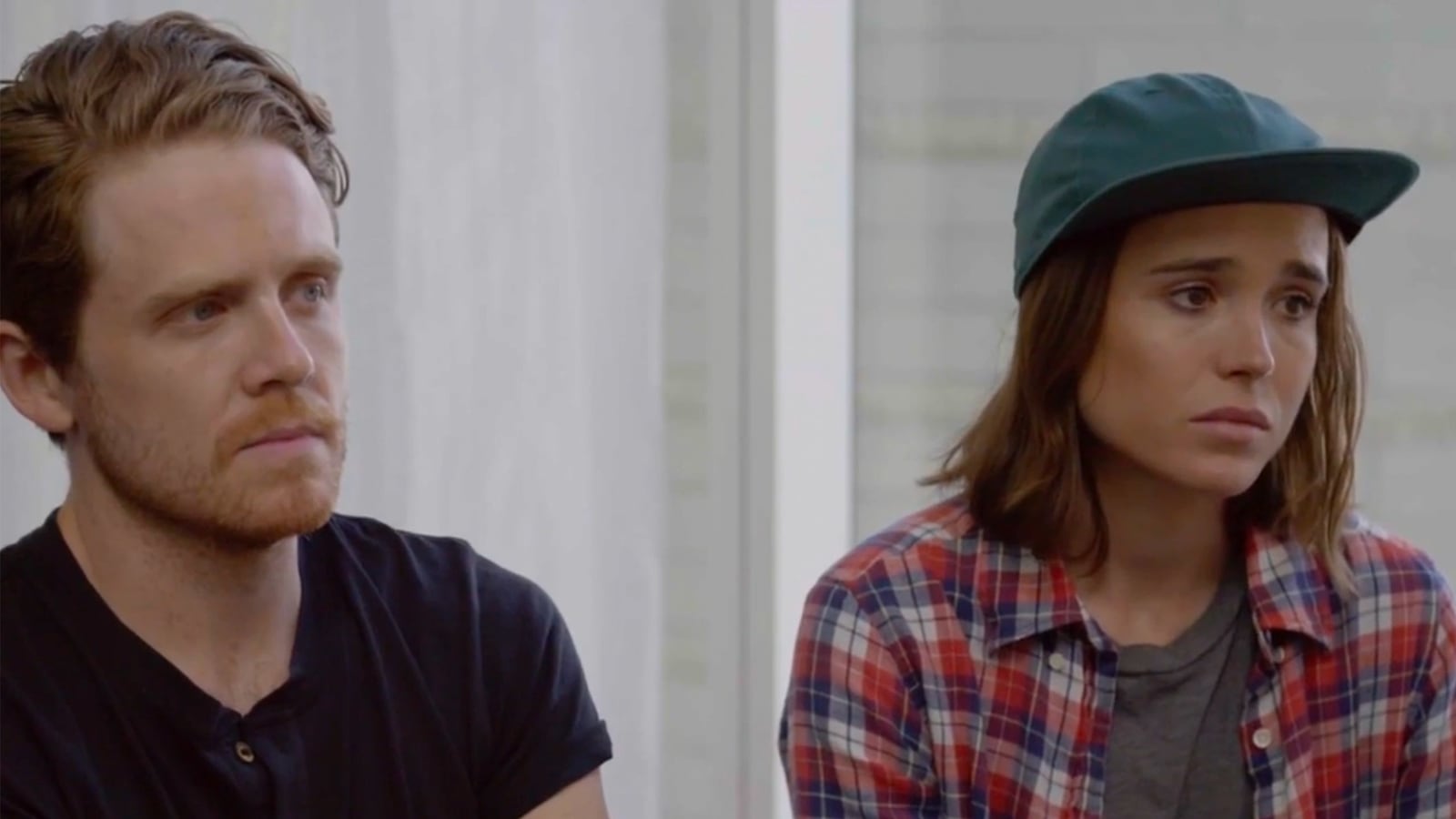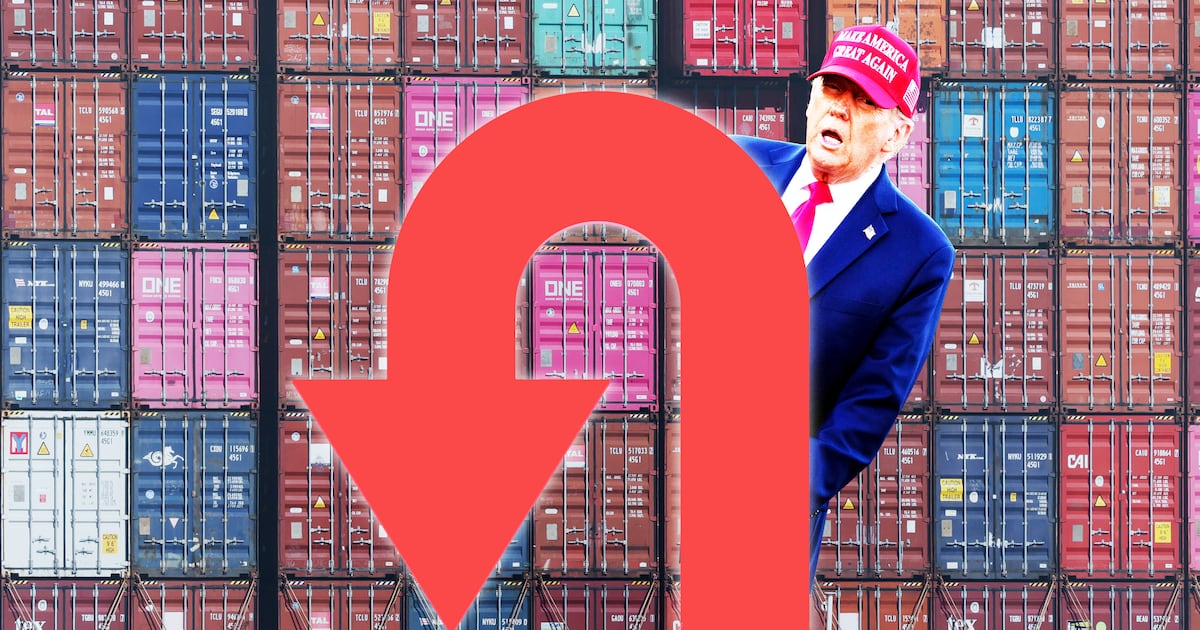Ellen Page and Ian Daniel are at the home of an Orlando man named Eddie.
It’s been five days since his friends Juan Guerrero and Christopher Andrew Leinonen were killed during a friend’s 21st birthday party at Pulse nightclub in Orlando, two of the 49 people killed during the worst incident of violence against LGBT people in United States history, and the deadliest terrorist attack in the country since 9/11.
Eddie is straightening his tie and getting ready to attend Juan and Drew’s funeral. The boyfriends will be mourned together.
“I already did my crying in the morning,” Eddie tells Page and Daniel, the hosts of Viceland’s Emmy-nominated docuseries Gaycation. “I’m feeling strong. I’m feeling very hopeful. I went to the viewing yesterday. It’s very hard to see the body of someone you love in a casket.”
Page cuts in to make sure he’s not late for the services. When they catch up with him at his house later that day he’s fixing that tie again, this time because he’s is heading to the wedding of his two gay friends.
In the span of an hour, bookended with Eddie’s story, we have relived fear, grieved loss, re-examined hatred and bravery, explored the idea of hope, and, coming full circle, celebrated the kind of love that abounded from the men and women who were reveling at Pulse that night.
It’s ambitious breadth pulled off by Gaycation Presents: Orlando, a special episode of the series that aired Wednesday night on Viceland, in which the Oscar-nominated actress and LGBT activist and her filmmaker best friend traveled to the community in the aftermath of the mass shooting to parcel out portraits of grief, pride, and maybe even lessons learned.
Two and a half months after the June 12 massacre, Gaycation is one of two docuseries (following MTV’s excellent True Life earlier this month) doing the admirable work of ensuring that the victims’ stories and the conversations the tragedy sparked remain in the spotlight after a fleeting news cycle has potentially moved on.
Over the course of the special, Page and Daniel interview Angel Santiago, a survivor of the shooting while he’s still in the hospital recovering from gunshot wounds. Two women shed light on the essential role the nightclub and its patrons served for members of the community who had been shunned by their own families. A vigil is visited, as well as one of the area’s only LGBT-friendly churches.
Through it all, Page and Daniel wear their emotions on their sleeve: heartbreak, fear, anger, confusion, extreme empathy. It’s an unorthodox style of reporting a documentary, but it’s a crucial and effective one in this case.
Activist Nancy Rosado, who works for the nonprofit Misión Boricua, remembers the chaos at the hospital the morning after the shooting, with families crowded around trying to find out if their loved ones were among the victims being treated, or, worse, deceased.
When a hospital worker read out the names of those being treated—all Latino names, read before their Latino families—the pronunciations were so mangled that the families couldn’t understand, heightening their worry and confusion.
“When you have to stand in a puddle of someone’s blood to fight for your people, you realize how marginalized you really are,” Rosado says, choking back tears. Page begins full-on weeping, and the three eventually envelop each other a long group hug, sobbing.
Page and Daniel are effective because they are conduits for the audience, who are both voyeuristically curious about what the experience of living through this tragedy has been like for this community but also still experiencing heightened emotions about its scope.
For the people they are interviewing, there’s something about them that radiates compassion and an open heart—a friendly ear for a message that needs to be heard, and for people to feel comfortable enough to share it.
Angel Santiago recalls the night of the massacre in harrowing detail, from dancing with his friend Jeff to hearing the gunshots to hiding from the shooter in the handicap stall of the bathroom. “We were all very quiet in there, everyone was, ‘Shh… shh…’” he says. “And that’s when in our bathroom the shots started coming at us through the stall wall.”
Santiago got shot in his foot and his knee. Jeff was shot in the collarbone and was bleeding profusely. Little by little, Santiago managed to army crawl his way out into the hallway, where a member of the SWAT team shouted at him to put his hands up. When he replied that he couldn’t stand because he’s been shot, he was instructed to drag himself over, after which to SWAT men quickly dragged him out of the club and into an ambulance.
Jeff also survived.
“Several people have said to me that I was brave, I was strong,” Santiago said. “I guess I was strong. But in terms of bravery, I was scared.”
He talked about growing up religious, and trying desperately to convince himself he wasn’t gay. That it took him until he was 26 to accept his sexuality. That when he gave an interview on TV after Pulse, in which he had to admit he was a gay man, it was something he could never imagine having done five years before. This whole event awoke something in him.
“I’m no longer ashamed of who I am,” he says, getting choked up. “As a matter of fact, I’m proud.”
The rawness of these emotions is key in telegraphing to viewers the pain of a tragedy like this, from all different facets. But the special wisely steers clear of victim exploitation or tragedy porn. Stories like Santiago’s are effective, and as captivating as they are hard to watch. But equally valuable in the special are segments devoted to the conversation the shooting started.
The scramble to find out who the shooter was is revisited: his motive, whether he was attached to a terrorist group, whether he was gay and closeted.
“In one dark night, the Pulse shooter brought to light some of America’s most divisive issues: intolerance for the LGBTQ community, Islamophobia, xenophobia, and gun violence,” Page says. “We may never know of his motives, or if his loathing was for himself or others. But the tragic outcome has left 49 dead and forced Orlando to grieve and process hate.”
There’s Fahad, who moved to Orlando from Pakistan after his family disapproved of his sexuality. He is no longer a devout Muslim, but he worries how having a Muslim name might affect his life in Orlando. Had he been at Pulse during the shooting, he admits, he would’ve been considered a suspect.
“People need to understand that it wasn’t a religion that pulled the trigger that day. It was more of an ideology. An ideology of hate,” he says. “The ideology could come from anywhere, that has nothing to do with any religion. It’s ignorance, intolerance, and when you just cannot respond to somebody, you bring in religion.”
Then there’s Patty Sheehan, the first openly gay commissioner in Orlando, who shepherded Page and Daniel around the makeshift memorials that were erected outside the hospital where the victims were shuttled and the city council building.
Visibly moved by the gestures on display at the memorials, she hopes there’s a deeper action taking place. “You can’t just say the murder’s wrong,” she said. “You have to say all the discrimination, all the hatred, everything that happens is wrong.” She and Page break down in tears again.
The special ends with Page and Daniel exploring the idea of the gay bar as a safe space, a place of refuge and acceptance for the community.
The sacredness of that haven has been violated, its role as a space for freedom and celebration tarnished. For any gay person who has not just internalized what happened at Pulse, but who also has now been subjected to bag and security checks when entering their favorite neighborhood gay bar in the months since, this is a painful truth.
Still, when Page and Daniel make their way to Parliament House, Orlando’s oldest gay bar, the encounter a dance floor teeming with the LGBTQ community, even though it’s been just days since the attack.
“In this moment, under the dim light, it becomes clear,” Page said. “We are not just dancing together. We are standing together.”





